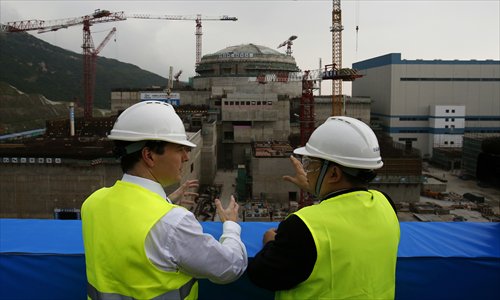Nuclear option

British Chancellor George Osborne (left) talks with Taishan Nuclear Power Joint Venture General Manager Guo Liming in front of a nuclear reactor being constructed in Taishan, South China's Guangdong Province, on October 17, 2013. Photo: AFP
French Prime Minister Jean-Marc Ayrault concluded his five-day visit to China with a trip on Sunday to Taishan, a city in South China's Guangdong Province, where two European Pressurized Reactors (EPR) are under construction.
Ayrault toured the nuclear power plant, which is being built by China General Nuclear Power Group (CGN) in partnership with French energy giant Electricite De France (EDF), and met a group of French staff members there.
Ayrault is the second high-level European official to visit the nuclear power plant in the last two months. On October 17, British Chancellor George Osborne visited the plant and announced that the British government will in future allow Chinese companies to buy majority stakes in British nuclear power projects.
China's "nuclear power diplomacy" dates back to three decades ago when the country started to build the Daya Bay nuclear power plant in Guangdong with help provided by France. After thirty years of development, "the global nuclear exports club" is ready to welcome China to join it, the Xinhua News Agency said in a report published on Sunday.
Nuclear power diplomacy
Chinese Premier Li Keqiang has played a significant role in pushing China's nuclear diplomacy.
After meeting with Ayrault in Beijing on Friday, Li told a media briefing that the two countries had agreed to jointly exploit other markets for nuclear energy.
Deepening nuclear energy cooperation was also on the agenda when British Prime Minister David Cameron visited China last week. Both sides agreed to seek breakthroughs in nuclear power and high-speed railway cooperation.
Li expressed the hope that China can have a joint-stake or even a controlling stake in British nuclear power projects, and Cameron said at a joint press briefing on December 2 that the UK welcomed investment by Chinese enterprises in its nuclear power projects.
It is common practice globally for high-profile political leaders to promote cooperation on nuclear energy, experts said.
During South Korean President Park Geun-hye's visit to Vietnam in September, she tried to boost South Korean firms' participation in the construction of nuclear power plants in Vietnam. When Japanese Prime Minister Shinzo Abe visited Turkey in October, he also aimed to assist the country's exports of nuclear power technology.
"Nuclear power development is a technology- and capital-intensive industry. And considering its sensitivity, no transnational cooperation can happen without political trust," Li Ning, dean of the School of Energy Research at Xiamen University, was quoted by Xinhua as saying Sunday.
During Premier Li's visit to Romania in late November, CGN signed a letter of cooperation intent with Romanian state-run nuclear power plant operator Nuclearelectrica on November 25 for CGN to participate in the construction of units 3 and 4 of the Cernavoda Nuclear Power Plant.
Into new markets
Recent remarks by top foreign and Chinese officials have been regarded as good news for Chinese nuclear power firms that are exploring overseas markets.
The UK government in October reached a 16 billion pound ($26.2 billion) deal with EDF to build the Hinkley Point plant in Somerset, UK. It will be the first new nuclear power plant in the UK since 1995, and was seen as a boost for the global nuclear industry, which has seen numerous projects canceled since Japan's Fukushima nuclear disaster in 2011.
EDF will lead a consortium including two State-owned Chinese companies - CGN and China National Nuclear Corporation - that will have a combined stake of 30 to 40 percent in the Hinkley Point plant, according to a statement released by EDF On October 21.
The project marked the first time that Chinese nuclear power firms have entered the market in a developed country. Previously, export destinations for China's nuclear power facilities were mainly in developing economies such as Pakistan.
"Low cost is the major advantage for China's nuclear power exports for grabbing market share in developing countries," Lin Boqiang, director of the China Center for Energy Economics Research at Xiamen University, told the Global Times on Sunday.
"Participating in a British nuclear power project is the best advertisement for China's nuclear power technologies," Lin noted.
"China can use the British reference to sell nuclear plants in other overseas markets."
Expanding overseas
China has the potential to become a major exporter in the civil nuclear sector and help boost global adoption of clean energy, experts said.
"China has accumulated abundant experience in building nuclear power plants, and the third-generation nuclear technologies the country has adopted are safer than technologies used in the Fukushima nuclear power plant," Han Xiaoping, chief information officer of China Energy Net Consulting Co, told the Global Times on Monday.
"Furthermore, Chinese firms' strong financing ability is another advantage for them in bidding for the Hinkley Point project, as many European countries lack funds for building nuclear power plants," Han said.
Currently China has 17 reactors in operation and 29 more under construction, ranking No.1 globally in terms of reactors under construction, Liu Hua, deputy head of the National Nuclear Safety Administration, said at an industry forum held in August.
"After three decades of development, relationships between Chinese and French nuclear power firms have evolved into a strategic partnership," He Yu, chairman of CGN, was quoted by Xinhua as saying.
"The relationship will evolve into competition in the future. Developed countries such as France and Japan are all potential rivals for China," Lin said.
According to Han, China's rising strength in civil nuclear exports will play a positive role in tackling global warming.
"Many developing countries cannot afford high-cost nuclear power plants," Han said. "If China can provide them with plants at affordable prices and ensure safety that can rival those produced by Western countries, it will help reduce carbon emissions."